Thomas Bach: IOC excited by 5G and taking OBS into the cloud
The combination of 5G and cloud technology will transform the Olympic Games and benefit fans, spectators, venues, organisers and athletes according to IOC president Thomas Bach.
The ninth president was the first representative of the International Olympic Committee to speak at Mobile World Congress, the world’s biggest annual gathering of the mobile industry. The event attracted 109,000 visitors to Barcelona last week.
 Bach joined a keynote session on the theme of ‘Intelligent connectivity: the great enabler’. In the media’s coverage of MWC19, Bach’s comments were somewhat over-shadowed by fellow speaker Guo Ping, rotating chairman of Huawei, who mounted a robust defence against recent high-profile allegations that the Chinese telecommunications network vendor posed a security risk to nations in which their equipment is deployed.
Bach joined a keynote session on the theme of ‘Intelligent connectivity: the great enabler’. In the media’s coverage of MWC19, Bach’s comments were somewhat over-shadowed by fellow speaker Guo Ping, rotating chairman of Huawei, who mounted a robust defence against recent high-profile allegations that the Chinese telecommunications network vendor posed a security risk to nations in which their equipment is deployed.
Conscious of the contrast between himself as the representative of an organisation founded on the heritage of the ancient Greeks and an auditorium full of people from the considerably younger mobile industry, Bach noted that “at the most basic level, both the IOC and the mobile technology industry are about connecting people.”
He went on to suggest that the Olympic Games were effectively a social network long before the internet came about: “The Olympic Games are always about connecting people, a shared experience, and building community – the same basic elements that are at the heart of digital media and social media.”
Bach observed that the Olympic Games’ long tradition of being at the forefront of putting the latest technology to practical use reflected Pierre de Coubertin’s view that “the Olympic Games are a pilgrimage to the past and an act of faith in the future”.
According to Bach, half the world’s population watched Rio 2016 while PyeongChang 2018 were the “most digitally viewed” Olympic Games in history: for the first time, mobile phones were the most used viewing device. Mobile usage was highest among 20-29 year olds.
“People today are connecting with the Olympic Games in more ways than ever before. They are doing so digitally and they are doing so on mobile,” said Bach. “Your vision for the future of mobile tech,” he told his audience, “is our vision for the future of the Olympic Games. This is not a challenge to overcome: this is a huge opportunity to reach even more people with the values of sport and the magic of the Olympic Games.”
Partnerships with Intel, Alibaba, Samsung, Visa and Omega reflect the IOC’s increased focus on digital technology.
The launch of the Olympic Channel on the web, mobile, connected TV devices, social platforms and linear channels in 2016 marked significant moment in shaping the IOC’s digital future. “In this digital age we cannot wait for people to come to us. We have to go where the people are. The people everywhere are living digital lives,” said Bach.
He was upbeat about progress to date, reporting that the Olympic Channel has already had more than two billion views with more than 80 percent of the audience under 35. “This is not just a technological imperative: it is a demographic imperative. It is a demographic imperative for us to reach young people, to promote the values of sport and to ensure the continued relevance of the Olympic Games.”
Bach sees 5G as an exciting opportunity to dramatically change the way people experience the Olympic Games. He reminded the audience that PyeongChang 2018 was the first time 5G was used at a global event and allowed visitors to experience gigabit wireless broadband and ultra low latency video distribution.
The first ever live virtual reality broadcast from cameras mounted on bobsleighs was a particular favourite of Bach’s and, he hoped, a portent of more coverage from the athlete’s point of view in the future. “VR and AR offer a completely new way to experience the magic of the Olympic Games. It conveys the emotions, the energy and atmosphere of sport. It takes the fans and viewers to the heart of the sporting action.”
Bach believes 5G will revolutionise Olympic broadcasting. “Simply put, you can do more with less resources. With 5G technology, cameras on the field of play can send high quality pictures directly to the TV production units and to the media broadcast centre without requiring any additional dedicated radio frequencies. This substantially reduces the time to deliver live content and also reduces operational costs.”
“With 5G technology, cameras on the field of play can send high quality pictures directly to the TV production units and to the media broadcast centre without requiring any additional dedicated radio frequencies”
He also talked about another disruptive moment that will come in the near-future: when the Olympic Games is run in the cloud. In collaboration with Alibaba it will be possible to expand broadcasting and media coverage of the Games with fewer resources. “Cloud scalability finally solves the long-standing problem in major sports events: how to manage the continuous increase of the technological complexity,” said Bach. “OBS and Alibaba are already leading the way with the OBS Cloud, a ground-breaking broadcasting platform.”
Cloud-based technologies are also being developed to help Judges and referees arrive at better decisions in scoring the performance of athletes. Digital judging in gymnastics could be implemented in time for Tokyo 2020.
While reiterating the IOC’s commitment to embracing a digital future, Bach noted that in all the discussions about the huge opportunity that mobile technology holds for the Olympic Games, “we should however never forget the one essential element: the magic of the Olympic Games is created by the people at the heart of the Olympic Games — the athletes.”
